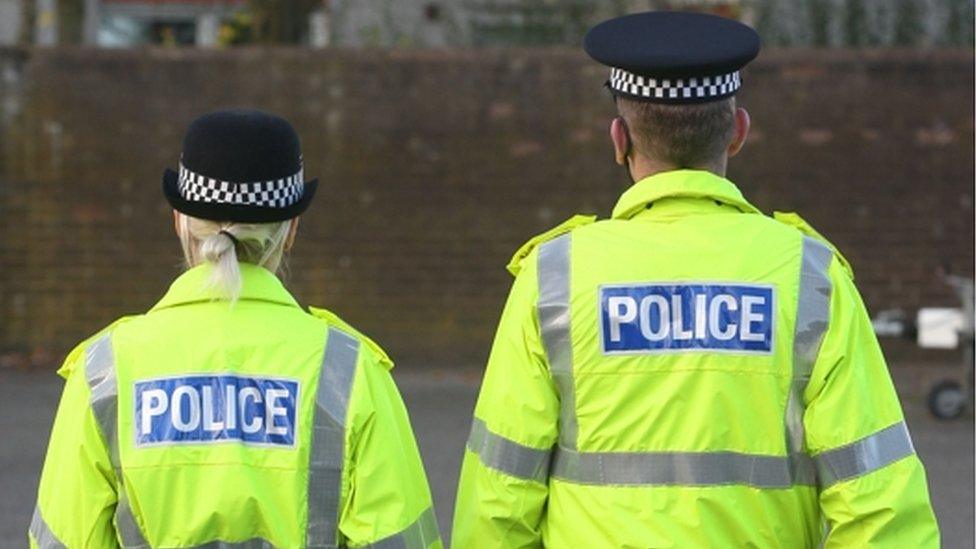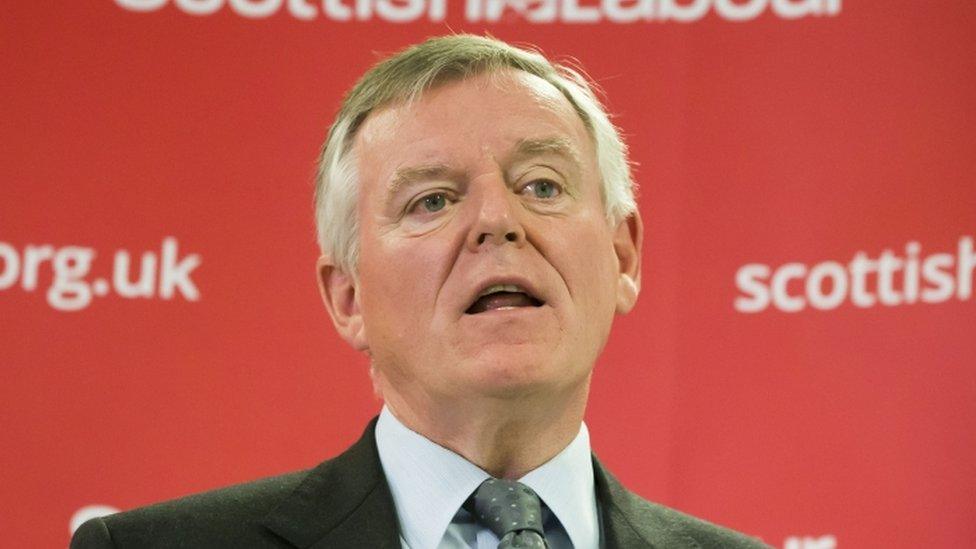Police Scotland: Call for return to 'community policing'
- Published

Scotland needs to return to the kind of community policing that was once the envy of the world, according to a review carried out by a Labour MSP, external.
Graeme Pearson said Police Scotland was "centralised and autocratic" with little local accountability.
He has outlined a series of recommendations aimed at improving the single service.
The Scottish government said Labour had fully supported the creation of a single police force.
A spokesman added: "Policing in Scotland is built on strong foundations. This SNP government has seen crime fall to a 41-year low, supported by the 1,000 extra officers that we have delivered - in stark contrast to England and Wales, which has seen a decrease of over 15,300 officers since 2007."
Mr Pearson is a former Deputy Chief Constable of Strathclyde Police who later headed the Scottish Crime and Drug Enforcement Agency.
Series of controversies
He said he had spoken to the public, rank and file officers, civilian staff, community groups, victim support staff and others while compiling his report on Police Scotland.
The force has been at the centre of a series of controversies since its creation in 2013, with its chief constable, Sir Stephen House, due to stand down from his post at the end of the month.
Mr Pearson, who supported the creation of the single force, said promises on local accountability and cost savings had not been delivered.
Among his recommendations were for the Scottish Parliament to create a new committee to oversee all of the emergency services, including the police.
He said this could help to end the "incestuous relationship" that can exist between ministers and senior officers.

Analysis by Andrew Kerr, BBC Scotland political correspondent
Graeme Pearson's political opponents tend to listen when he speaks. His CV is impressive when it comes to policing matters - he is, after all, a former director general of the Scottish Crime and Drug Enforcement Agency.
He says he went into politics with the aim of seeing a unified police force for Scotland - but now he's disappointed at the way it's turned out.
The well-documented problems are frequently raised in his report - the failure to attend the M9 crash; the death of Sheku Bayoh in custody in Fife.
But Mr Pearson also emphasises what he sees are the fundamental failures in Police Scotland - the lack of accountability and promised cost savings not being delivered.
As he launched his policing review at Scottish Labour HQ, he said those failures meant a "fraud" had been perpetrated on the people of Scotland.
Mr Pearson's review is no doubt well-intentioned but remember - he's not some kind of independent figure, despite that CV. He's Labour's justice spokesman.
The Scottish government are, of course, aware of the apparent problems at Police Scotland.
The Justice Secretary Michael Matheson has not responded personally to Mr Pearson's report. The Scottish government points out that Mr Pearson did, after all, support the creation of a single force.
I put it to Graeme Pearson that there are teething problems in any major change - but he sees them as more than that.
As we approach the election in May, ministers will want to dampen down or try to quickly resolve issues while Labour - doing their job as a party of opposition - will be keen to point them out.

He also suggested that the chairman of the SPA should be confirmed by a vote of the whole Scottish Parliament.
Mr Pearson argued that the SPA had the "demeanour of a rubber stamping body" and had failed in its role to hold the chief constable to account over issues such as deploying armed officers to routine calls and the force's use of stop and search tactics.
If the SPA board had been "playing its role effectively some of the controversies that have beset Police Scotland would have been avoided," his report said.
Mr Pearson also said the Police Investigation and Review Commissioner (PIRC) should be given the sole responsibility for the conduct of investigations alleging misconduct and criminality affecting the service.

Mr Pearson unveiled his report at an event in Glasgow
Mr Pearson said: "The people of Scotland need and deserve a police force that does its job thoroughly and efficiently. It has been increasingly clear in recent years that Police Scotland is not working properly.
"Going around the country, listening to what ordinary officers, staff, members of the public and local politicians have had to say has painted a worryingly consistent picture of a centralised, politicised and autocratic police force with little to no meaningful local accountability.
"All this has emerged as a consequence of the Scottish government's handling of the formation of Police Scotland."
He also said the Scottish government had "failed to produce a full business case for Police Scotland".
'Admission of guilt'
Mr Pearson said the business case should have set out the justification for the reform; the costs involved; and a detailed expectation of the benefits of merging the country's eight regional forces.
The Scottish government said Mr Pearson's claim was wrong as "there was a full outline business case for police reform with significant stakeholder input which was published in its entirety as part of the financial memorandum to the Police and Fire Reform Bill, backed by cross-party support".
Scottish Liberal Democrat leader Willie Rennie said Mr Pearson's report was an "admission of guilt by the Labour Party who first proposed centralisation and then voted for the SNP's Bill even though there was no proper business plan."
He added: "The Labour Party may not be in charge but they must bear some of the responsibility for what went wrong with Police Scotland."